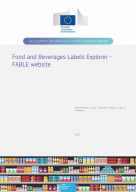Details
- Publication date
- Authors
- Grammatikaki Evangelia, Dias Joana, Rovera Michele, Bailas Loizos, Ben Enrico, Wollgast Jan
- Publisher
- European Commission
- Related department
- Joint Research Centre – Ispra
- JRC Number
- 135985
Abstract
The intakes of specific nutrients of concern (i.e., salt, sugars, and total fat and saturated fat), associated with non-communicable diseases (NCD), are above the recommended intake in adults across the European Union (EU). Composite food products made up of a range of ingredients and often pre-packed can drive the excessive intakes of these nutrients. Policies that promote reformulation of these products for wider and healthier food and beverage choices are among the policies recommended to tackle unhealthy diets, the so-called NCD Best Buys due to their effectiveness and efficiency; such policies can lower the intake of these nutrients of concern. Regular monitoring of food environments and such related-policies is however lacking; good quality and representative data about the food offer in supermarkets are difficult or expensive to obtain and are essential to gauge and further improve the effectiveness of such policies. The Food and Beverages Labels Explorer (FABLE - https://food-labels-explorer.jrc.ec.europa.eu/en) hosts data on branded food and beverage products across Europe collected within three public-funded projects, EUREMO, JANPA and Best-ReMaP. The harmonised food product nomenclature makes for more effective data analysis and comparability between countries. FABLE is designed so that future data collection efforts can be easily incorporated in the database. Its dynamic dashboard enables users to explore, interact with and visualise data on the nutritional content of branded food and beverage products across Europe. It encompasses a wide range of food categories such as bread products, breakfast cereals, soft drinks, and dairy products. FABLE allows for (1) country comparisons for specific nutrients and food groups, (2) deep dives into each country/food category-specific nutrient of concern, and (3) the possibility of making time comparisons on the progress of the nutritional quality of the food offer.

